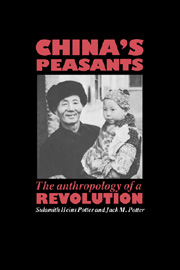Book contents
- Frontmatter
- Contents
- List of illustrations
- List of tables
- Preface
- Notes on the text
- Map 1 China
- 1 The old “feudal” order: Zengbu before Liberation
- 2 Establishing the new order
- 3 The ordeal of collectivization
- 4 The Cultural Revolution
- 5 Maoist society: the production team
- 6 Maoist society: the brigade
- 7 Maoist society: the commune
- 8 Impatient aspirations: transition to the post-Mao period
- 9 The cultural construction of emotion in rural Chinese social life
- 10 Marriage, household, and family form
- 11 Chinese birth planning: a cultural account
- 12 Lineage and collective: structure and praxis
- 13 Party organization
- 14 The party ethic: a devotion born of distress and enthusiasm
- 15 A caste-like system of social stratification: the position of peasants in modern China's social order
- 16 The Chinese peasants and the world capitalist system
- 17 The crystallization of post-Mao society: Zengbu in 1985
- References
- Index
2 - Establishing the new order
Published online by Cambridge University Press: 02 December 2009
- Frontmatter
- Contents
- List of illustrations
- List of tables
- Preface
- Notes on the text
- Map 1 China
- 1 The old “feudal” order: Zengbu before Liberation
- 2 Establishing the new order
- 3 The ordeal of collectivization
- 4 The Cultural Revolution
- 5 Maoist society: the production team
- 6 Maoist society: the brigade
- 7 Maoist society: the commune
- 8 Impatient aspirations: transition to the post-Mao period
- 9 The cultural construction of emotion in rural Chinese social life
- 10 Marriage, household, and family form
- 11 Chinese birth planning: a cultural account
- 12 Lineage and collective: structure and praxis
- 13 Party organization
- 14 The party ethic: a devotion born of distress and enthusiasm
- 15 A caste-like system of social stratification: the position of peasants in modern China's social order
- 16 The Chinese peasants and the world capitalist system
- 17 The crystallization of post-Mao society: Zengbu in 1985
- References
- Index
Summary
Guangdong was one of the last parts of China liberated from the Guomindang. It was not occupied by the People's Liberation Army until the end of 1949. Several weeks earlier, in Tiananmen Square in Beijing, Chairman Mao had already declared the establishment of the People's Republic of China. In the “old revolutionary bases,” where the new government had ruled for a long time, and in the “early liberated areas,” such as northeastern China, tasks such as establishing the new government in the cities and the country-side, recruiting and training a reliable group of cadres, propagandizing the peasants and organizing them to overthrow the landlords and local bullies, and carrying out land reform, were already well under way; in Guangdong they had not yet been undertaken (Vogel 1971, p. 42).
In Dongguan county, the East River Guerrillas had occupied Dongguan and Shilong prior to the arrival of the People's Liberation Army, which took over from them. District governments were established in these towns, which were important to Zengbu because of their proximity, but for a period of two years between Liberation and the end of 1951, little of structural significance happened in Zengbu itself. The old landlord-gentry officials, although restless and uneasy, remained in power. Rice-purchasing contingents from the new government came out to Zengbu in 1950 to buy rice for the cities. The new government organized song and dance propaganda troupes which came to Zengbu to explain the Communist party and its programs to the peasants, but there were no other changes of consequence.
- Type
- Chapter
- Information
- China's PeasantsThe Anthropology of a Revolution, pp. 36 - 58Publisher: Cambridge University PressPrint publication year: 1990



